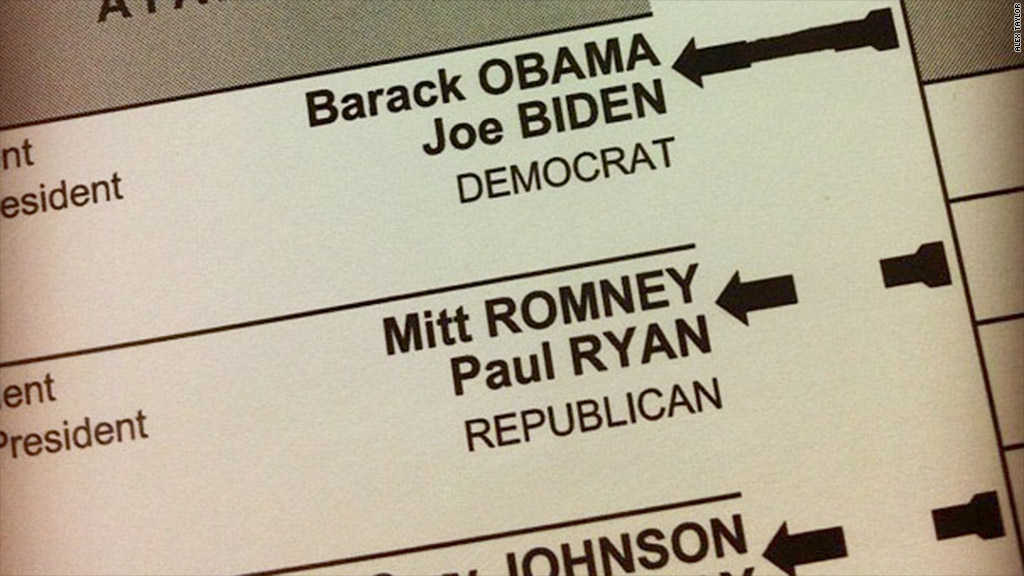
We live our lives online now, tweeting our thoughts and uploading Facebook photos everywhere we go. But if you snapped a quick picture of your ballot this Election Day, you may have broken a state law.
Most states expressly prohibit filming or photographing inside polling places, or disallow the sharing of one's own ballot. The rules vary widely from state to state, and so do the potential punishments -- but experts say actual prosecution is unlikely.
"We have 50 states, and they go in many different directions on this," says Jeff Hermes, director of the Citizen Media Law Project (CMLP) at Harvard's Berkman Center for Internet and Society. "Some have no laws, some only concern particular times and places. And they all vary in terms of penalties attached."
The CMLP compiled a chart explaining the rules in each of the 50 states. Some provisions come from formal laws on the books, while other states have issued other types of official written statements. Penalties range from a misdemeanor charge -- punishable in some cases with a year in jail -- up to felony charges.
If you used Facebook (FB), Twitter or Instagram to share your vote, though, you probably won't be carted off to jail anytime soon. Hermes says he doesn't "know of any court cases involving such issues."
A few voters in states that do allow images reveled in their freedom. Rhode Island Alex Taylor praised his state's "super-simple and low-tech" ballot with an Instagram snap of his choices.
"Not illegal in Rhode Island," he responded when commenters warned him about ballot photos. "Thank you for your concern!"
For voters in states that prohibit photo-taking or sharing, Hermes says it's not worth the risk.
"If you're exercising your First Amendment rights and it's at the discretion of law enforcement, you're in a dangerous situation," he says. "That defense might hold up in a court case much later, but it's tough to use that in the field."
Before this Election Day many voters were unaware of the laws, which predate social media and were enacted largely to deal with problems like vote-buying. Many news outlets reported on the legal risks on Tuesday, raising awareness -- but also setting off a tweetstorm of misinformation.
Related story: Why you can't vote online yet
Singer Toni Braxton tweeted Tuesday afternoon: "Make sure you guys don't post pics of your ballot! They will be voided if you are caught, you don't have to prove who you voted for! :)"
CMLP's Hermes chuckled when asked about Braxton's claim, and noted that only Hawaii and Michigan have any type of laws with provisions that "perhaps a vote would not be counted if it were disclosed." Even then, he thinks it's not likely those laws would be used to prosecute someone Facebooking a ballot or to void their vote.
The First Amendment issues around ballot photos get blurry in an era when people are accustomed to using their digital tools to play watchdog.
For example, one Pennsylvania voter's YouTube video went viral on Tuesday after he captured an electronic voting machine that appeared to mark for Mitt Romney a vote he was trying to cast for President Obama. CNN later confirmed that the machine, located in Pennsylvania's Perry County, was recalibrated after the voter pointed out the problem.
That video would have a strong First Amendment defense, Hermes says, because it captured "an item of substantial public concern."
For most voters, though, he says it's best to follow the letter of the law.
"It's important to be aware of these laws because they exist, and it's important not to defy officials at the polling place," Hermes says. "But people also shouldn't be afraid of going to vote. All of these laws are designed to make your vote count."
Even without photos, plenty of people are broadcasting which ballot boxes they checked off. A Pew Research Center report released on Tuesday found that 22% of registered voters told people how they voted through posts on social networking sites like Facebook and Twitter.

